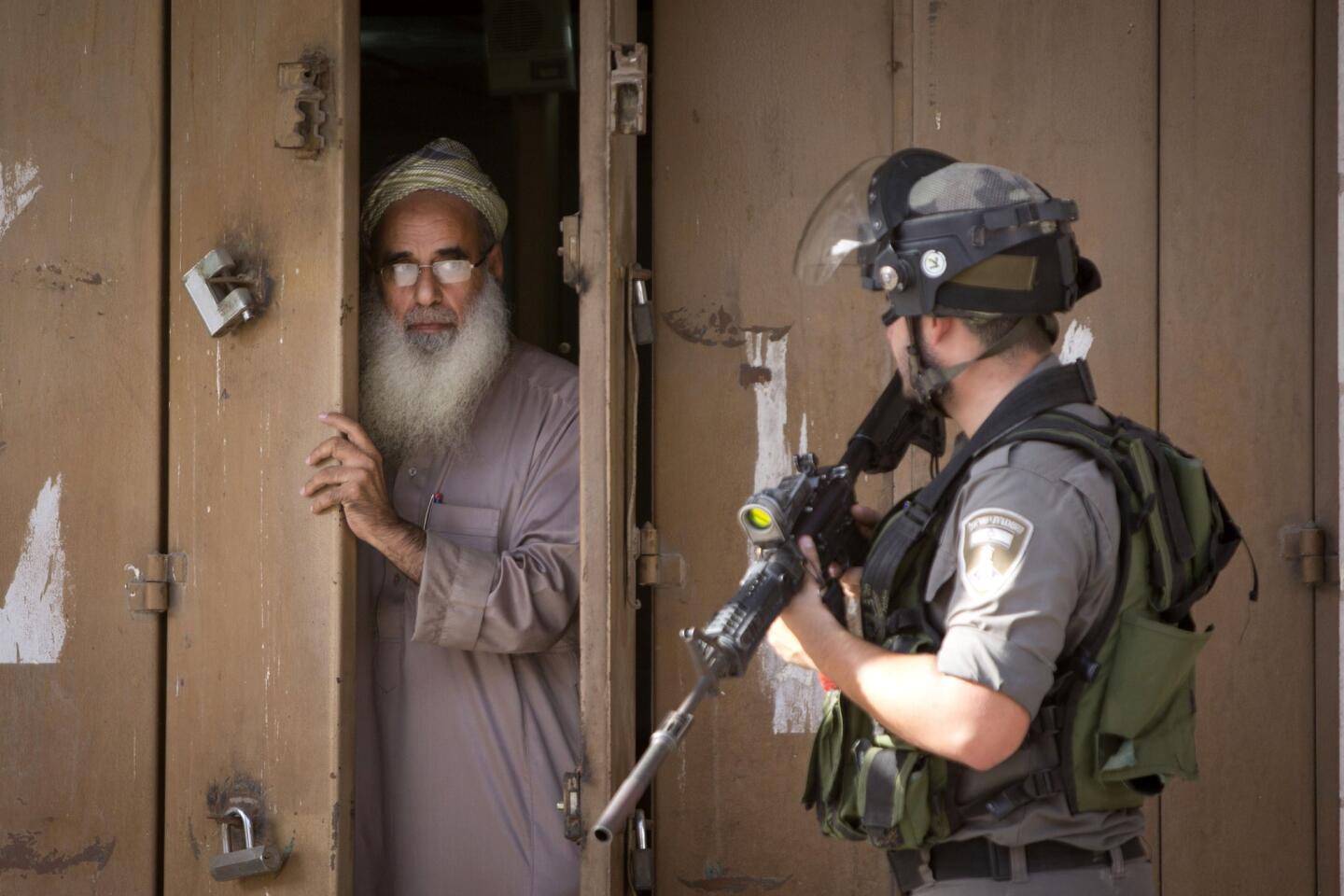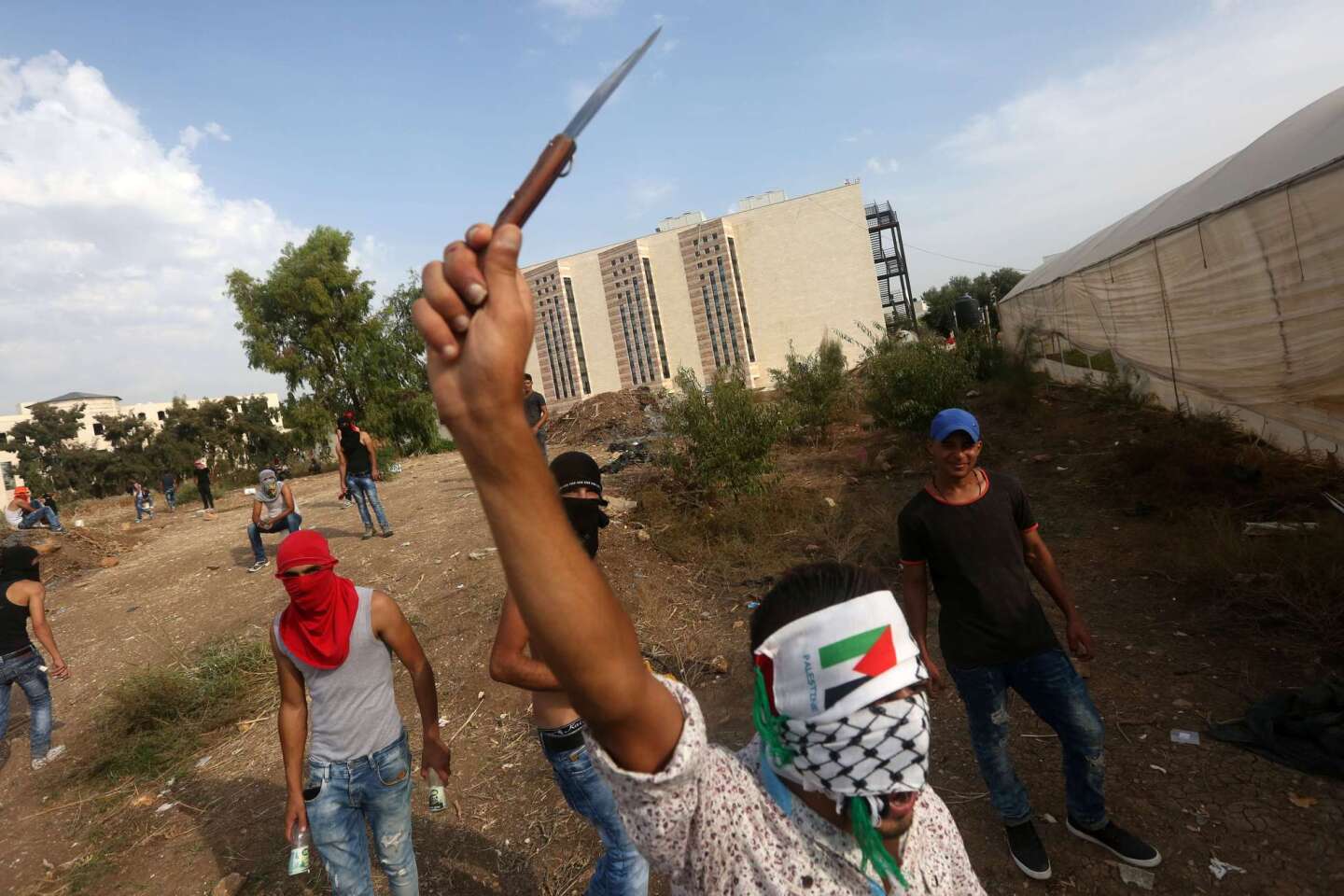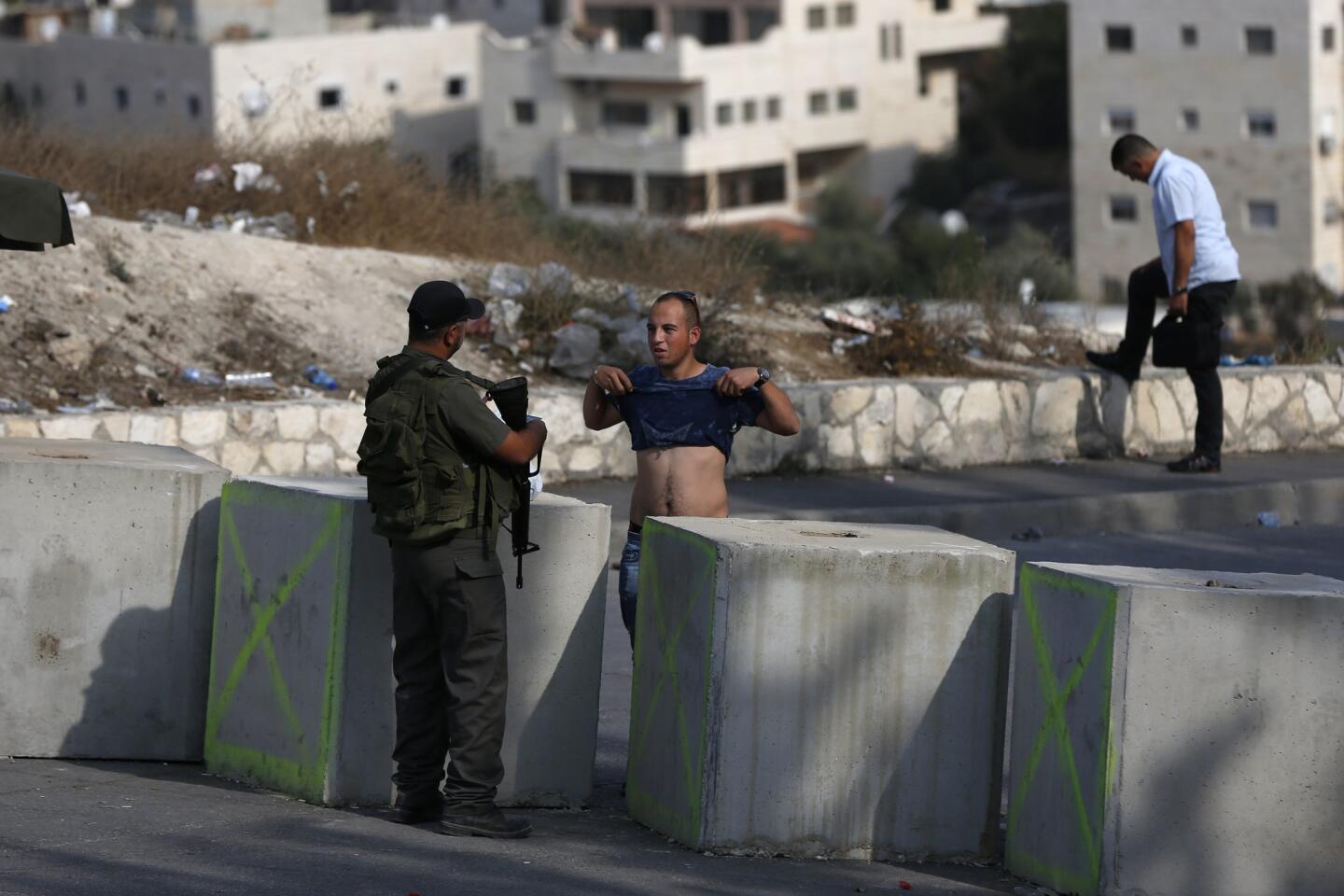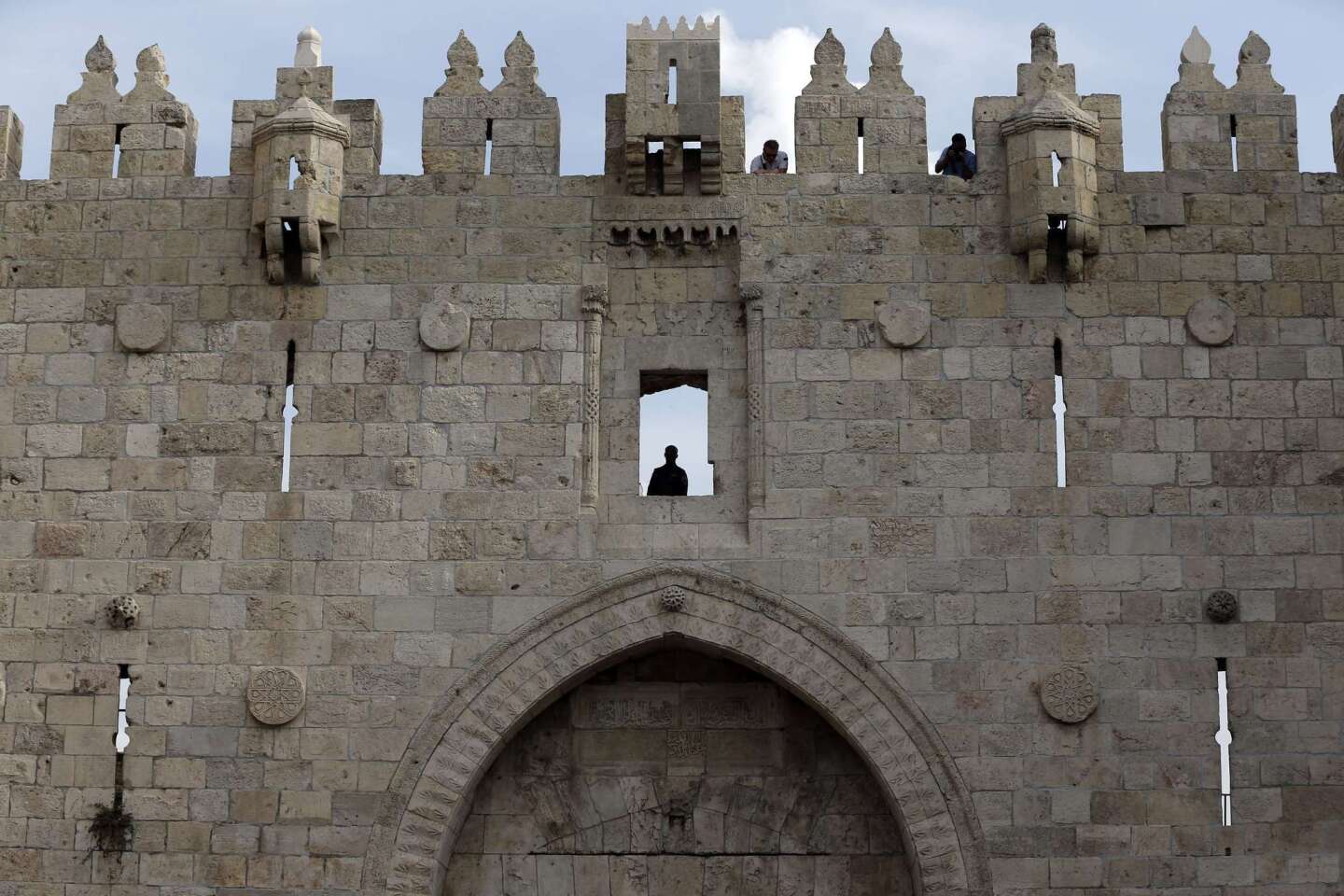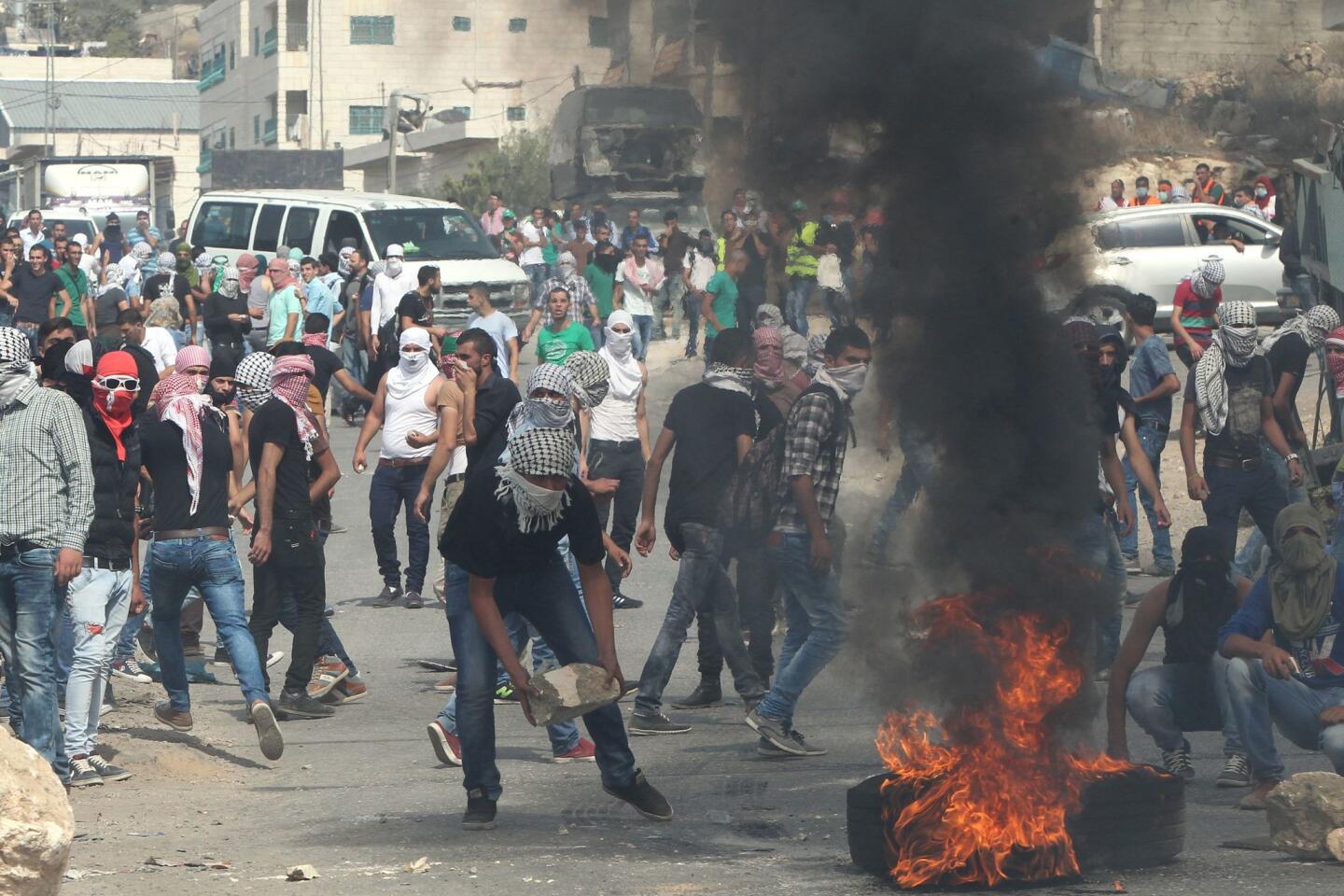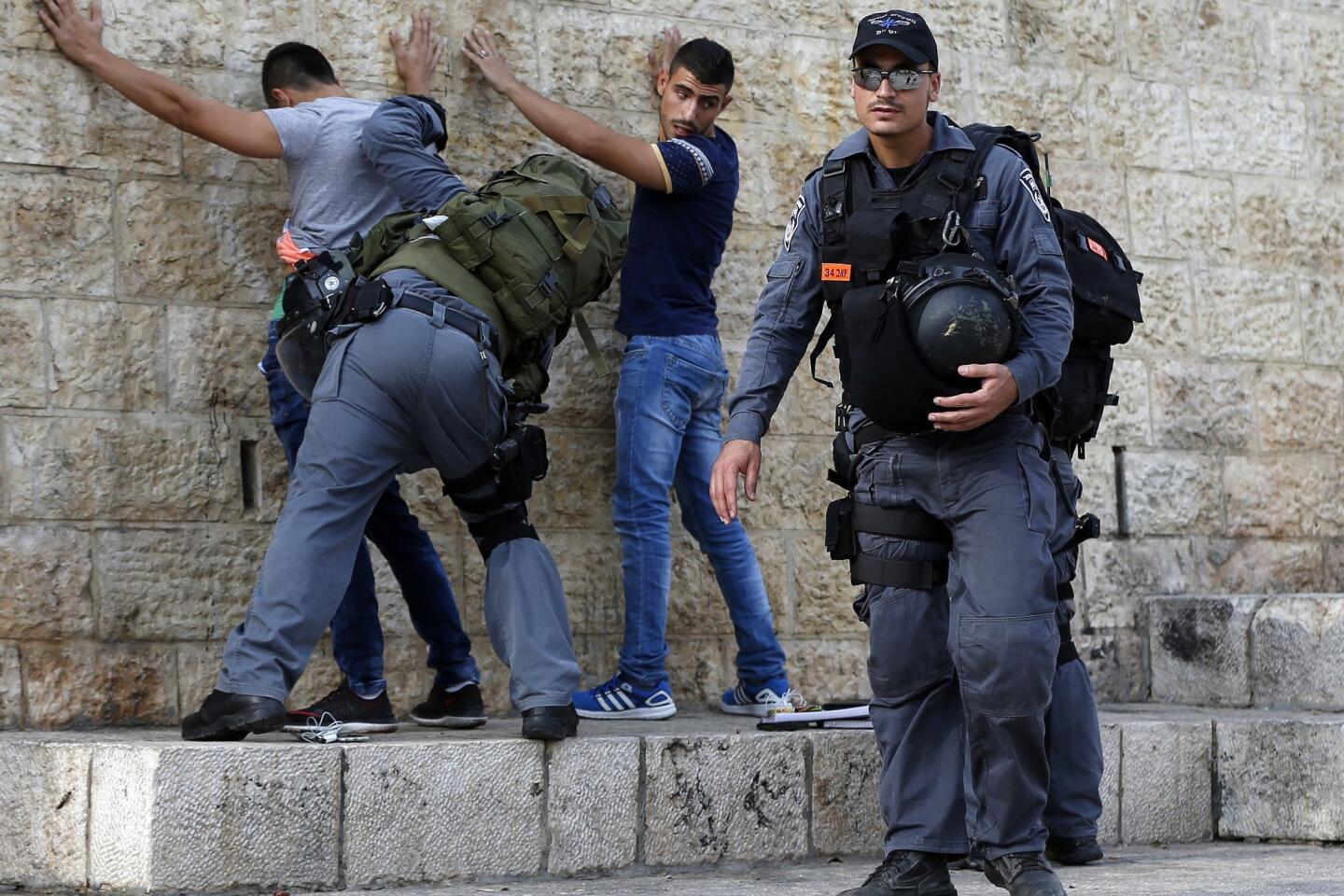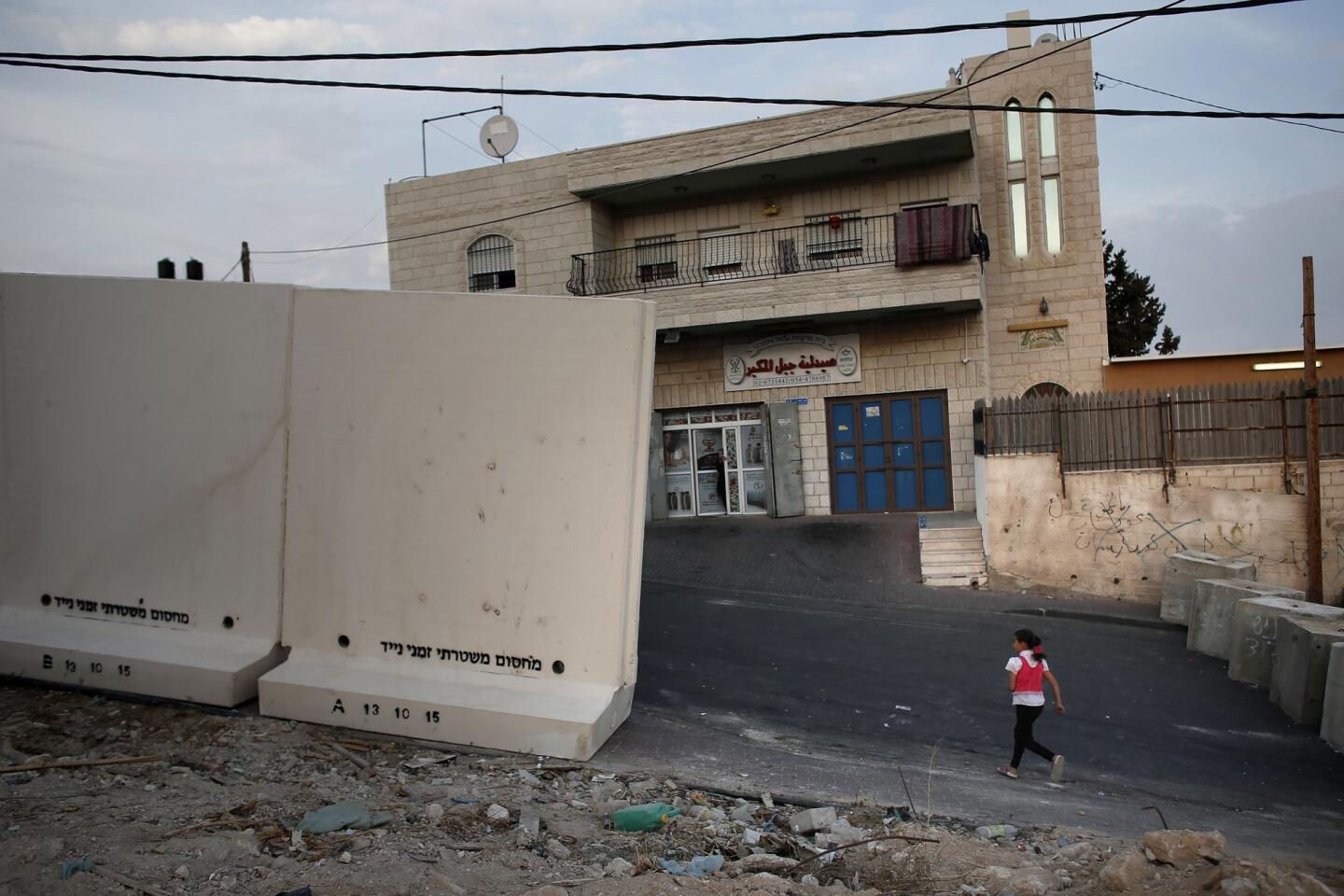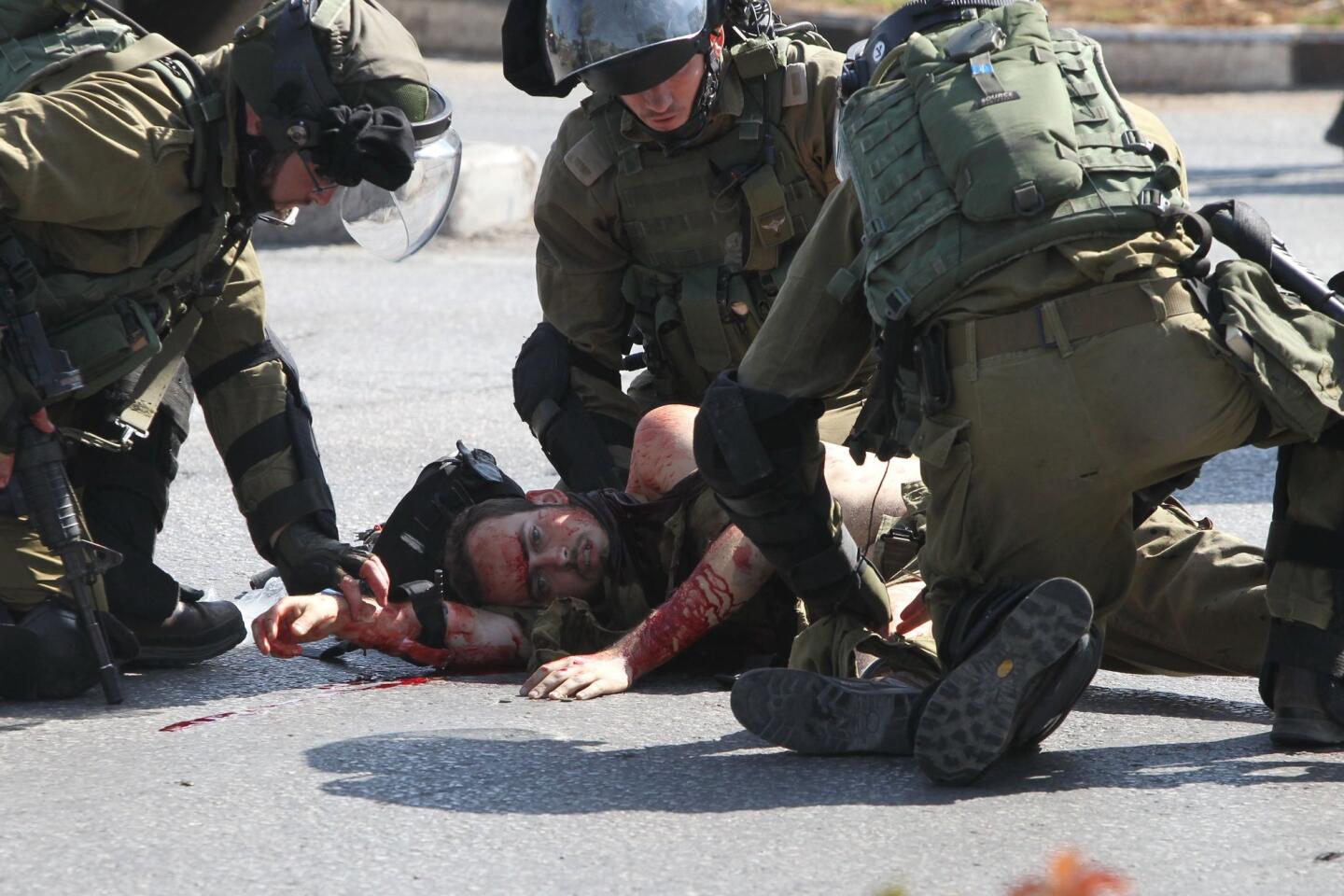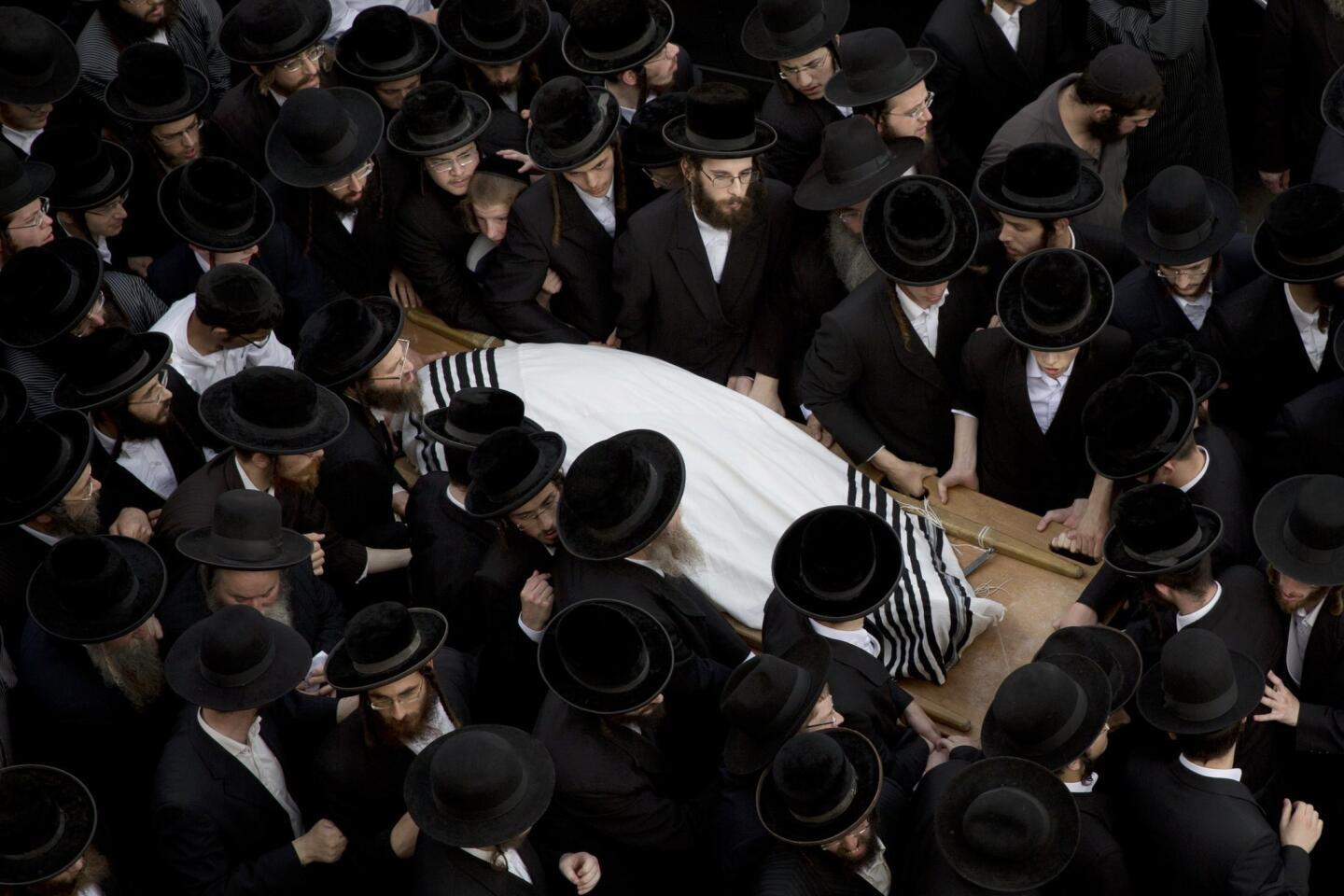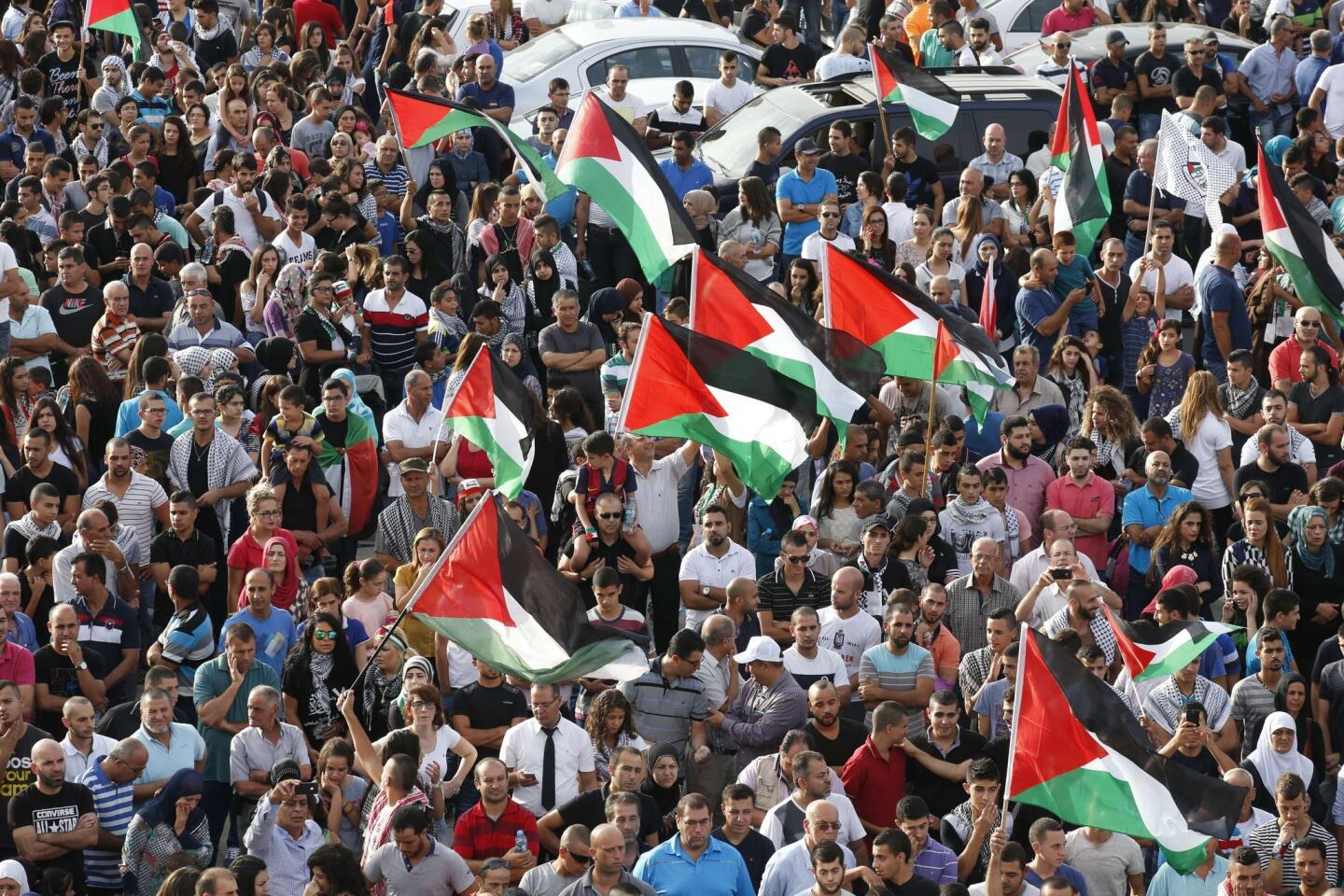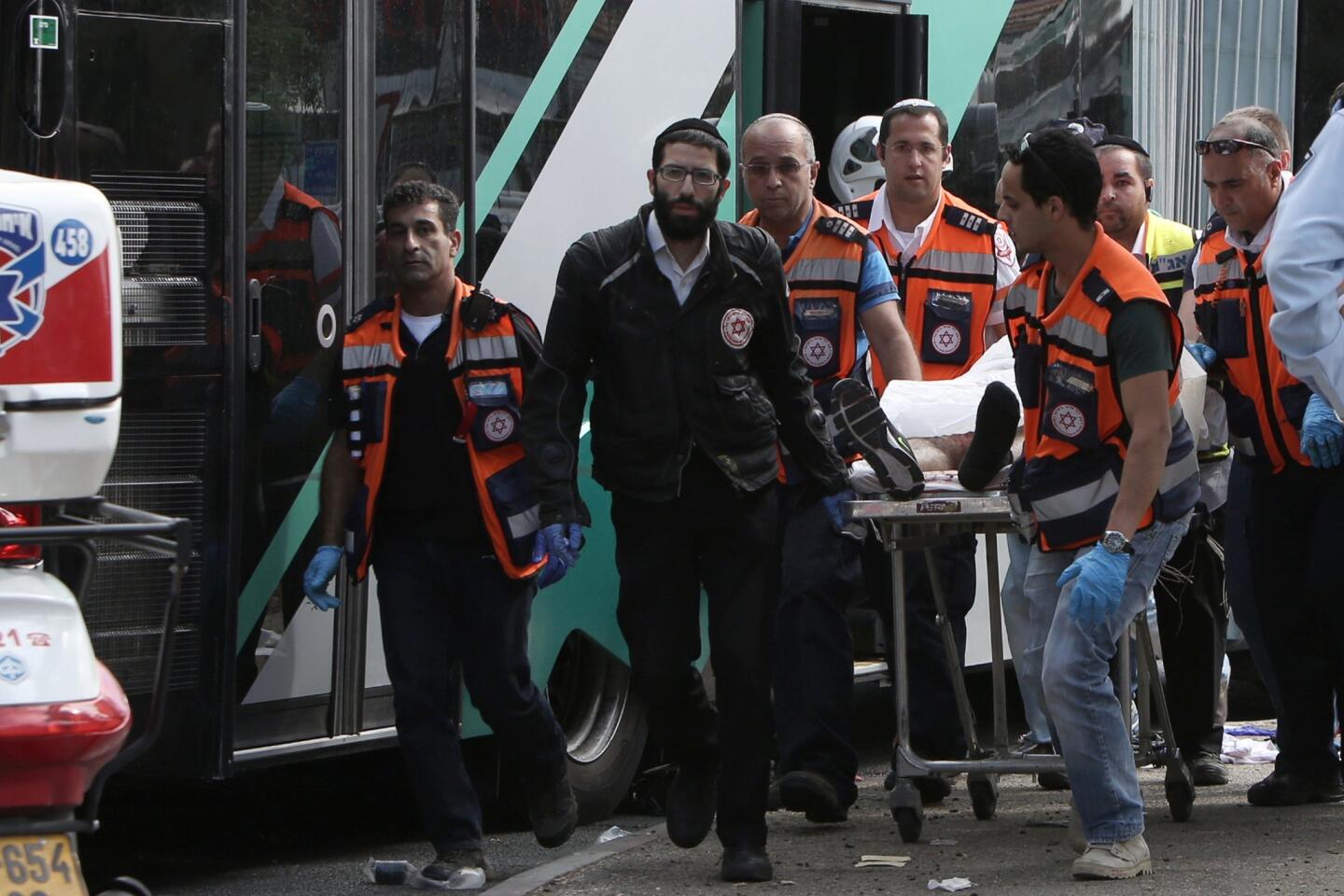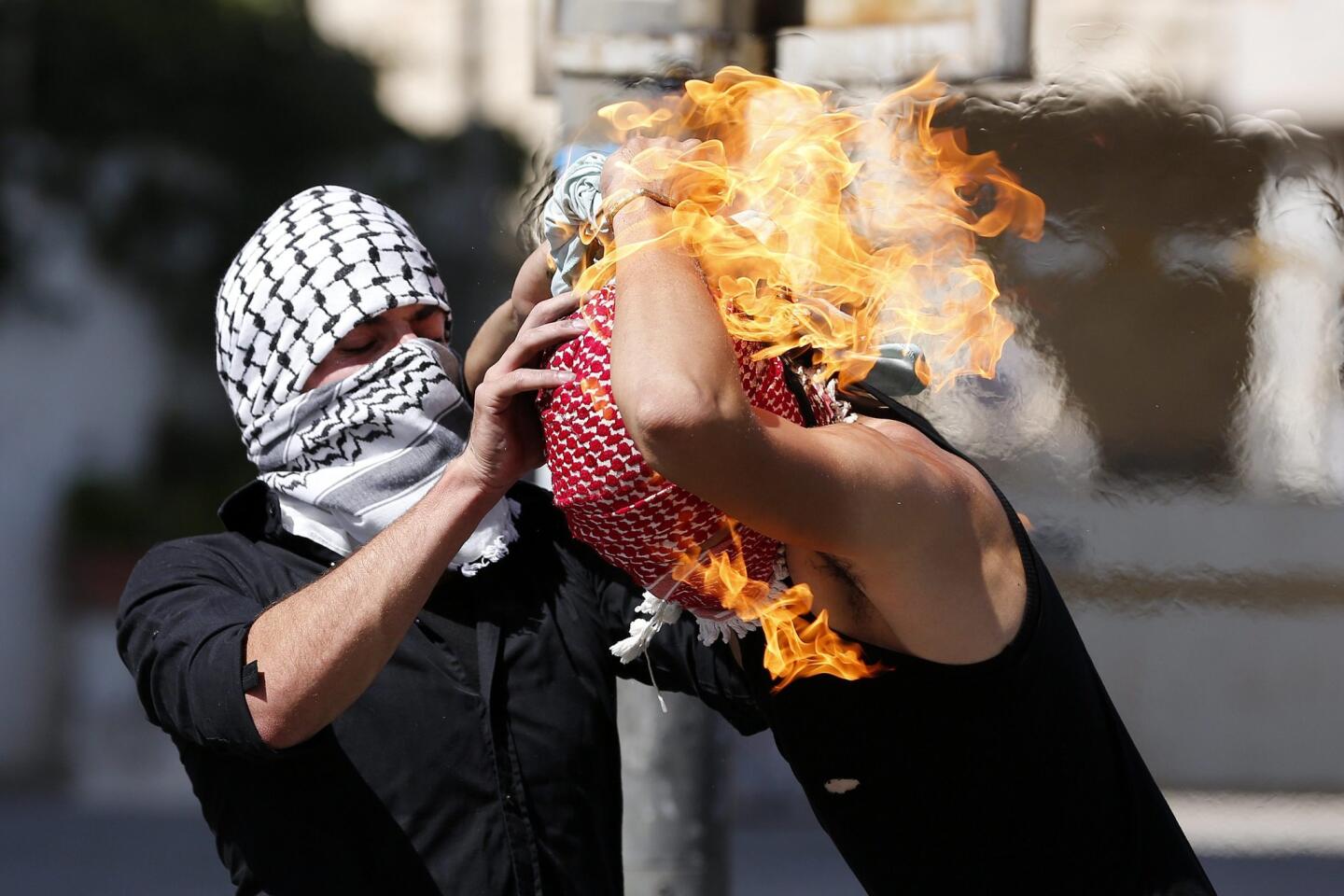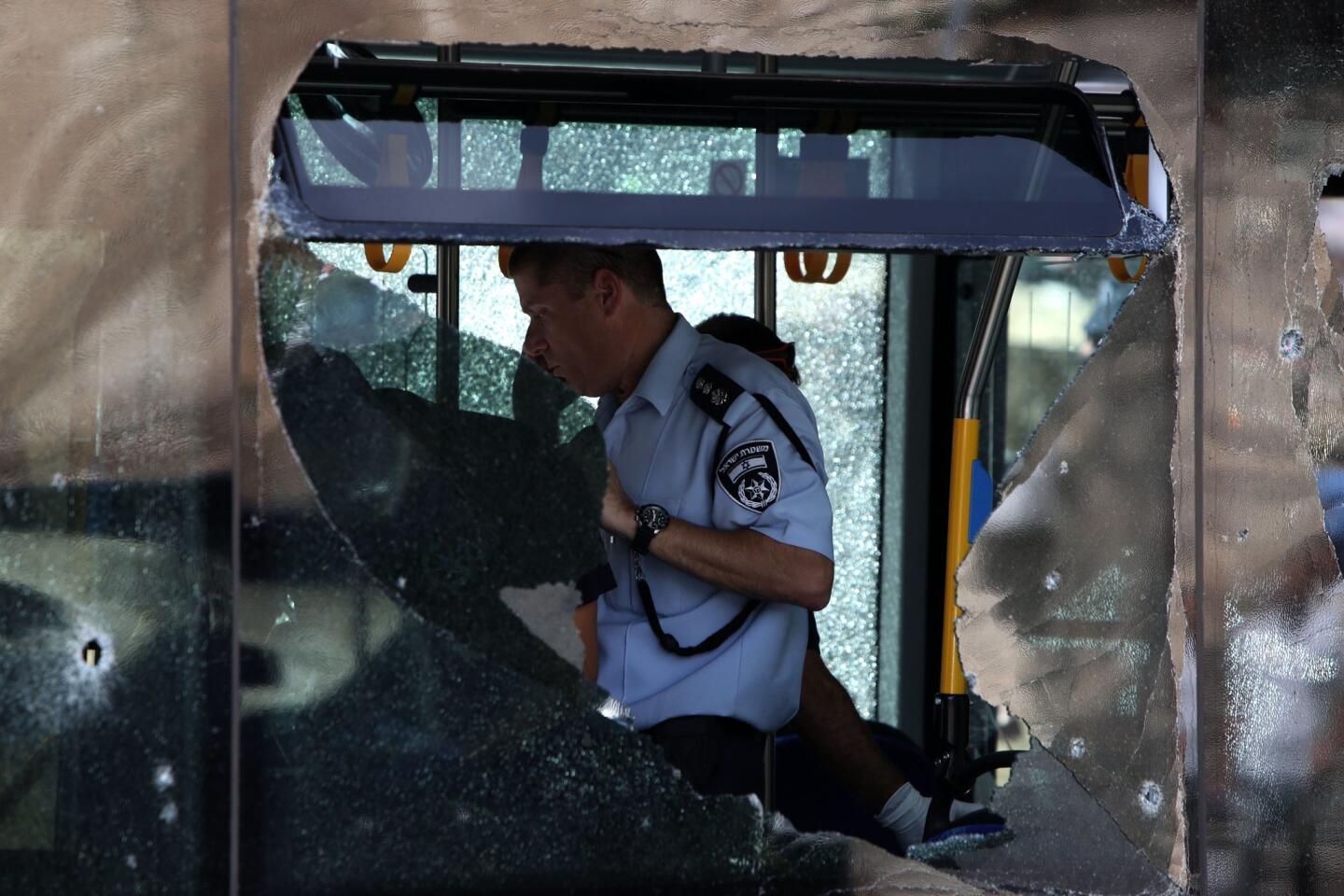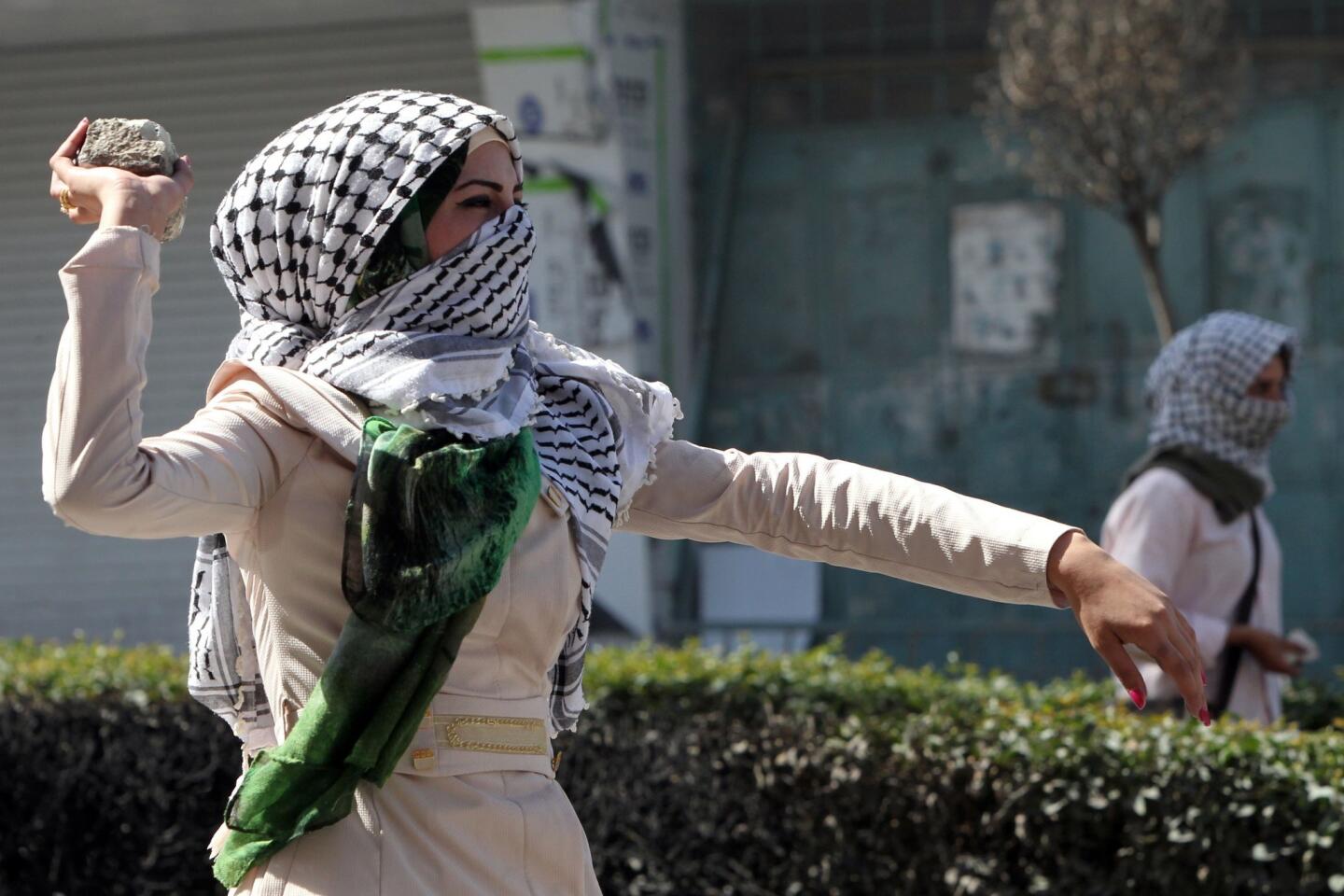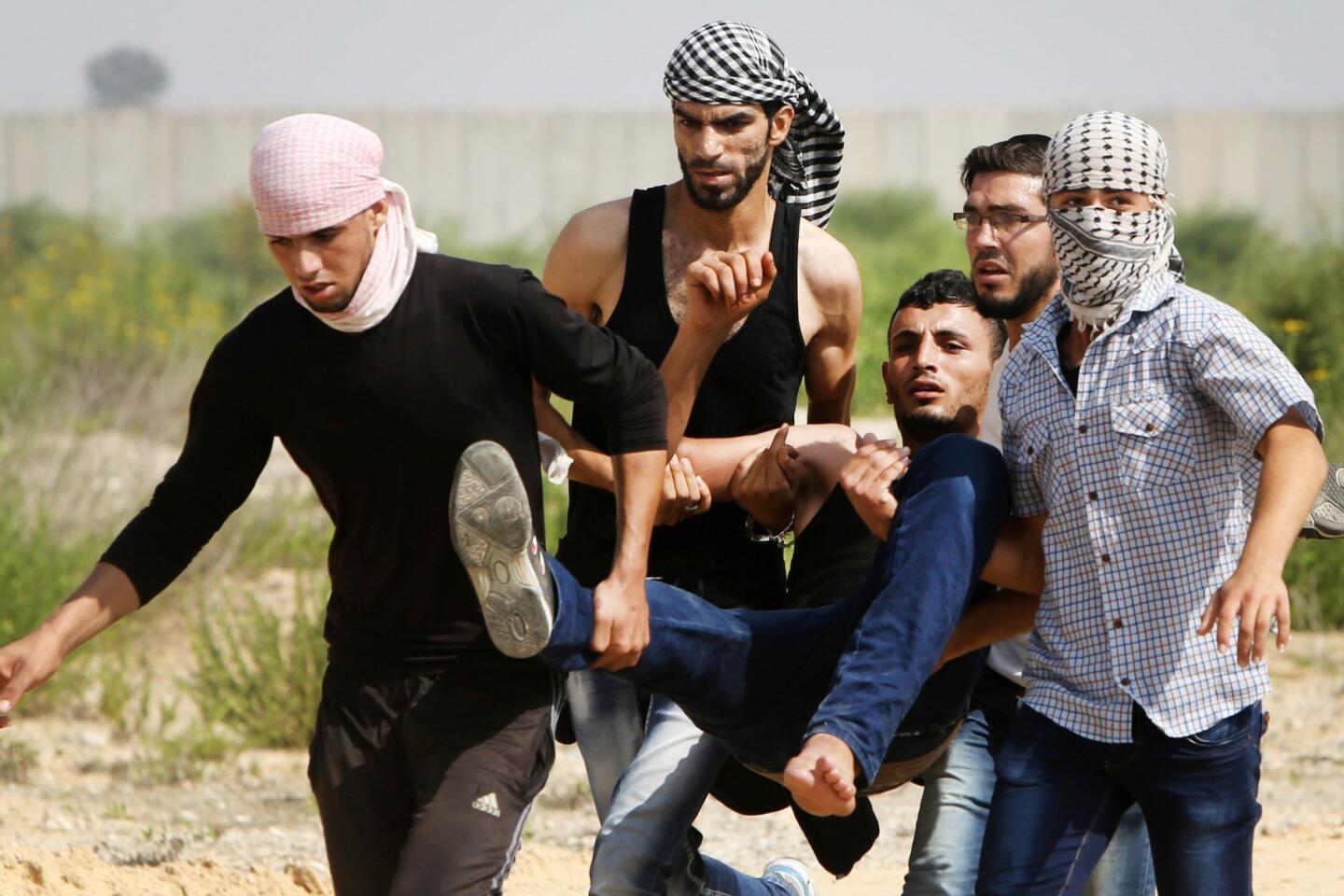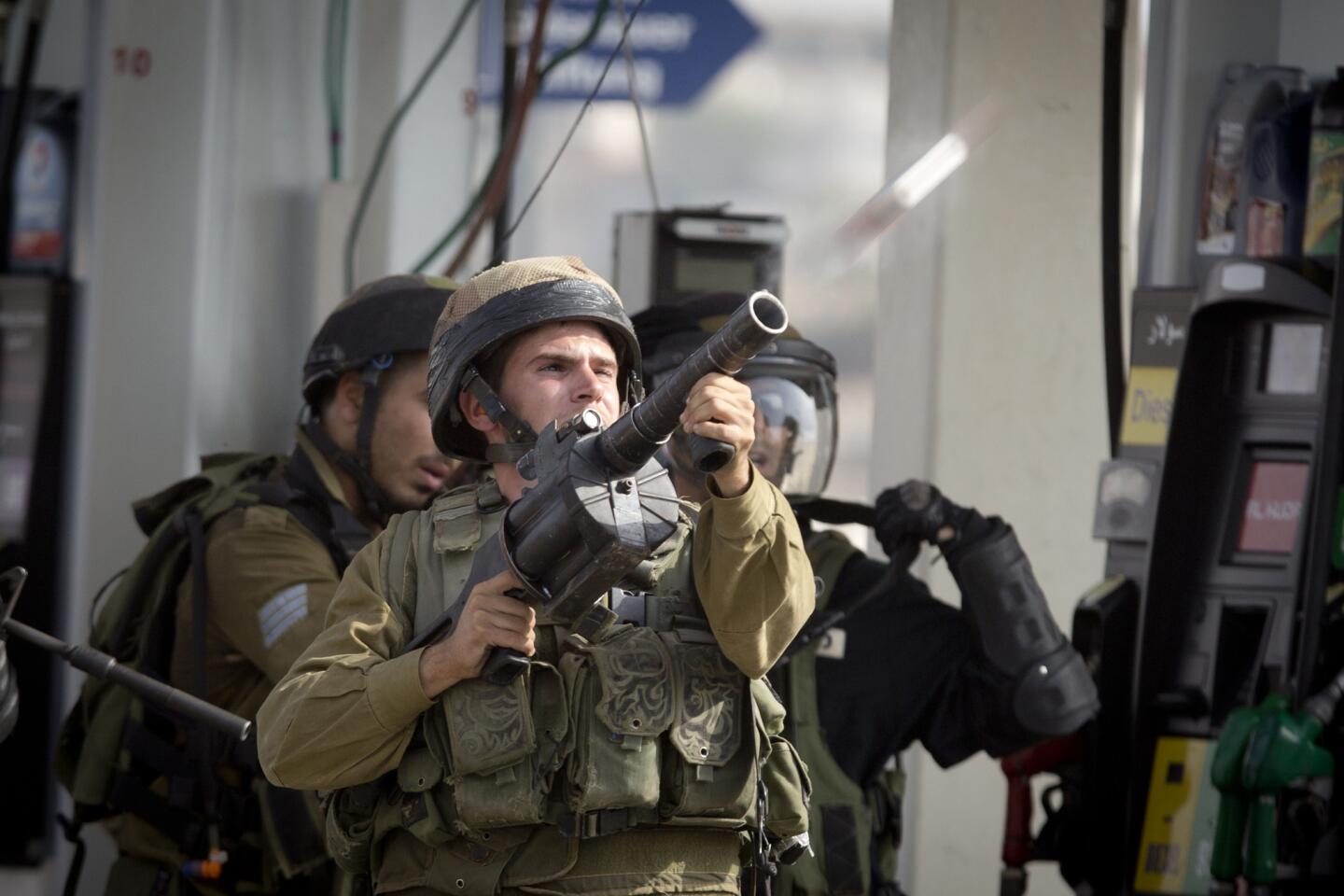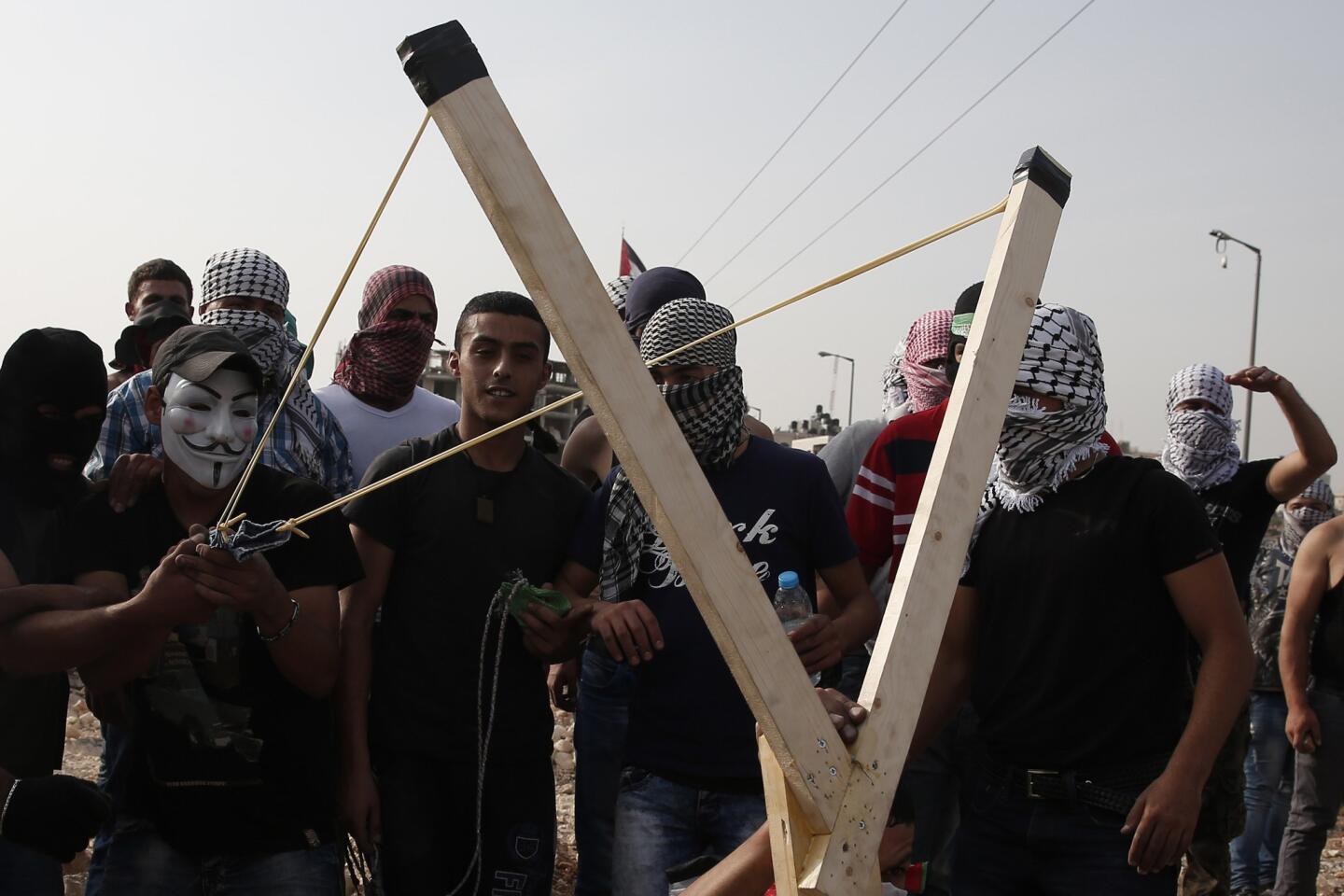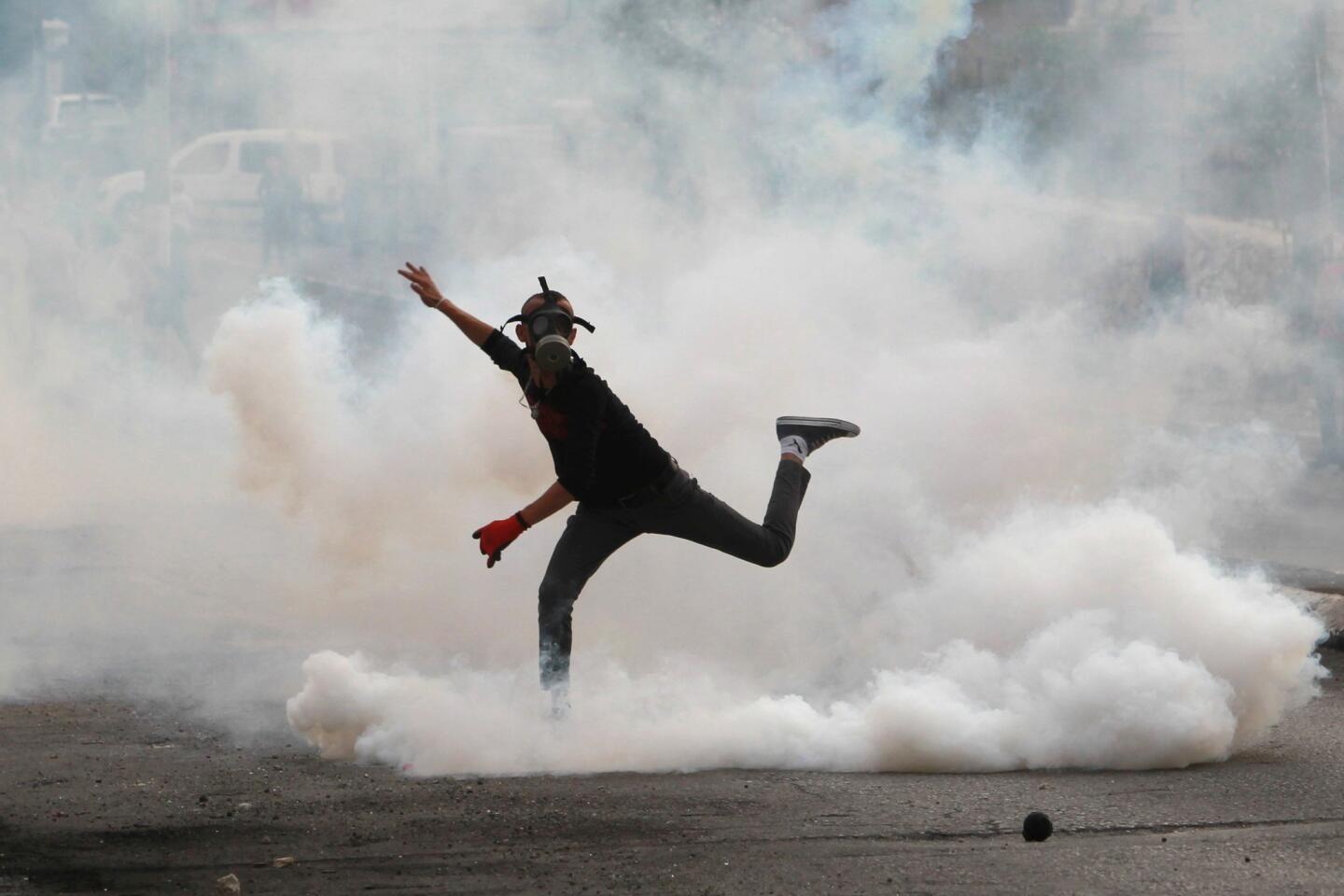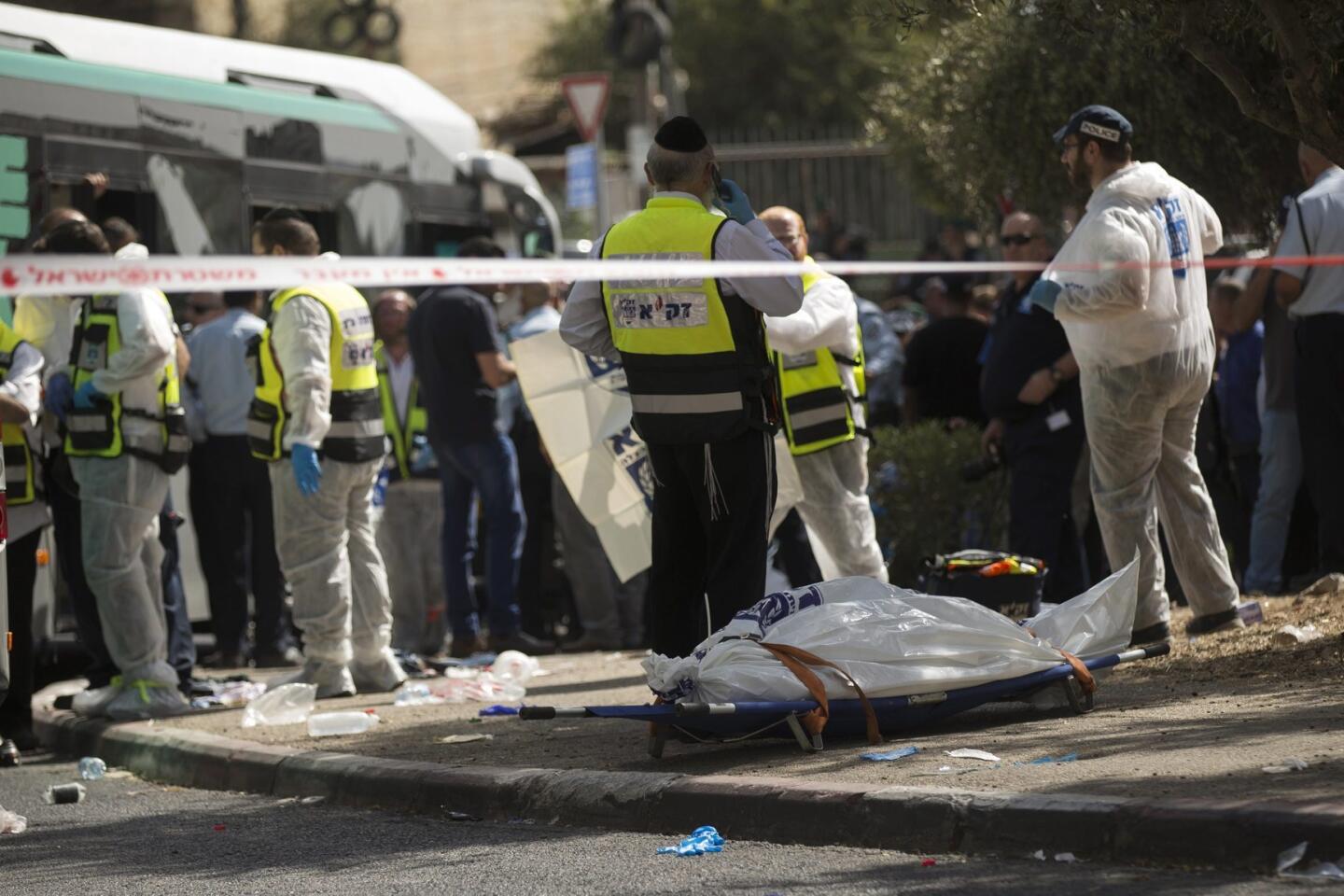Israel absorbs horror in aftermath of bus station attack
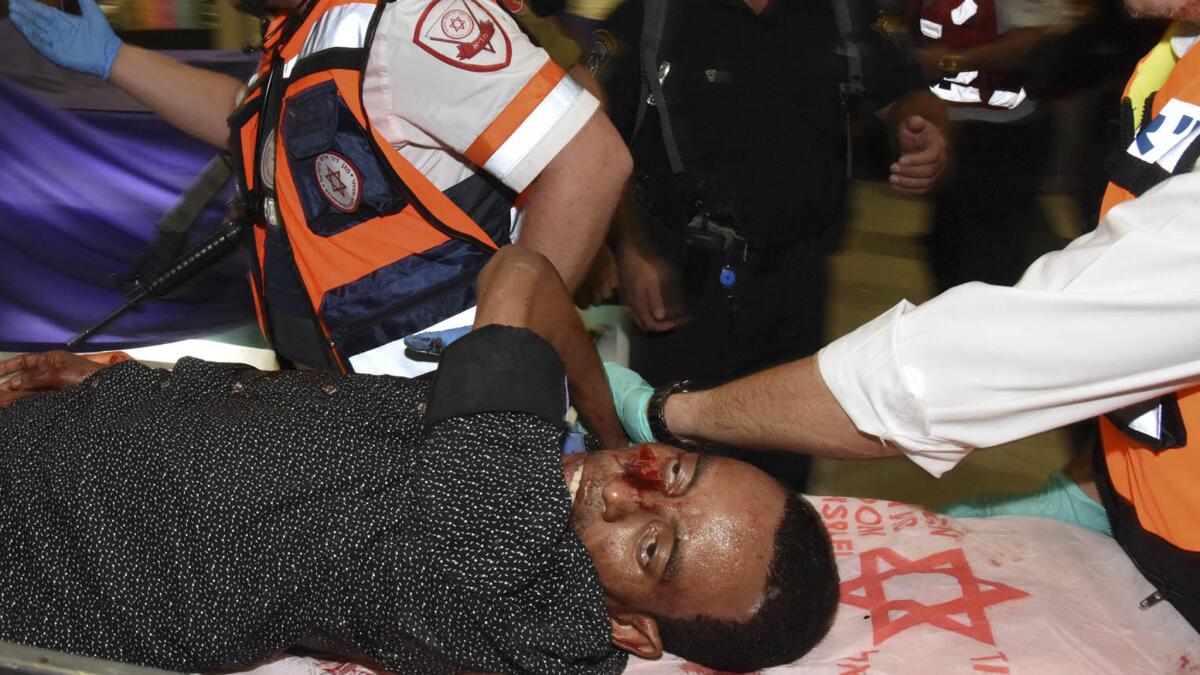
An Eritrean man mistaken for an attacker by a security guard at a bus station in Beersheba, Israel, during a shooting is evacuated after being wounded. He later died.
- Share via
Reporting from Jerusalem — Omri Levy, 19, was a soldier. He fought to join the famed Golani Brigade, despite a bad back that could have exempted him from combat duty.
Mila Habtom Zerhom, 29, was an African asylum seeker. He fled his native Eritrea seeking a new life away from the heavy-handed regime and made his way to Israel like many tens of thousands of his countrymen.
And Mohannad Oqbi, 21, was an Israeli Arab, a metalworker who was a member of the Bedouin community in the southern part of the country and had, by one account, been drawn to the radical messages being disseminated by Islamic State militants.
The paths of these very different young people crossed tragically in the city of Beersheba on Sunday, leaving all three dead and prompting a fresh round of soul-searching in the communities they left behind.
Heated debate continued to swirl in Israel on Monday in the aftermath of the attack, in which Oqbi went on a shooting rampage through a crowded bus station, authorities say, killing Levy and injuring 10 others. A security guard, assuming Zerhom was an accomplice, shot him, authorities said, and then an angry mob beat him. He died later at a hospital.
Remembrance candles glowed at the site of the attack Monday evening, a modest gesture for two victims who died as differently as they lived.
Levy was killed first. Authorities said Oqbi fatally shot him with a handgun and then grabbed Levy’s automatic rifle and shot civilians and police officers. Returning from weekend leave, Levy had been headed to join his friends on his unit’s assignment near the border with the Gaza Strip to counter Palestinian protests. He was pronounced dead on arrival at the hospital.
Blue-eyed and blond with a trademark smile, Levy was from the small agricultural community of Sdei Hemed, whose residents had watched him grow up and, on Monday, saw him buried next to his father. Outside the Levy family home, death notices in simple black lettering were posted on the wooden garden fence as soldiers and neighbors huddled outside.
NEWSLETTER: Get the day’s top headlines from Times Editor Davan Maharaj >>
“We are all hurting today,” said Zeev Fatal, the community secretary. “It is a small community; we all knew him.”
Zerhom, the Eritrean, had come to Beersheba to renew the visa that allows him temporary residence in Israel. He worked in a greenhouse near the Gaza border, where his employer, Sagi Malachi, told the Ynet news site that Zerhom was a dedicated, pleasant and modest man who did his work quietly and well.
When the shooting began in the bus station, he ran for cover, authorities said. A local security guard, seeing a foreign-looking man on the run, assumed he was a terrorist and shot him. As Zerhom lay wounded on the floor in a pool of blood, a mob beat him, kicking him and bashing him with metal benches. Efforts by several to protect the injured man failed, and he was taken to the hospital in critical condition.
One of the men recounted for television cameras how he beat the presumed terrorist. “He was dripping blood, dripping, dripping,” he said. “Too bad he didn’t die.”
This is what sliding into an abyss looks like. One crime breeds another. Indiscriminate shooting in Beersheba. Fatality and injuries. Fear and hysteria. Lynching an asylum seeker.
— Opposition lawmaker Dov Khenin
But overnight he did. By that time, it was clear he was not involved in the attack and authorities had announced there had been only one gunman, Oqbi, who had been fatally shot by police. Investigators began rounding up images from security cameras at the bus station to identify and locate the people involved.
Israeli media interviewed one man who acknowledged participating in the beating. He said police had asked him why.
“I told them I thought he was a terrorist,” said the man, identified only by his nickname, Dudu. “I told them that if he was a terrorist, no one would have said a word about it. Today I regret it, but this is only in hindsight.”
The man added: “I didn’t sleep well at night, all I could think of was this. I felt disgusting.”
Throughout Israel, from Prime Minister Benjamin Netanyahu on down, there was widespread condemnation of what was widely described as a lynching.
“Even when the blood boils, such an act is strictly and utterly forbidden,” said opposition leader Isaac Herzog, who called the incident a “shocking lynching.”
“This is what sliding into an abyss looks like,” opposition lawmaker Dov Khenin wrote on Facebook. “One crime breeds another. Indiscriminate shooting in Beersheba. Fatality and injuries. Fear and hysteria. Lynching an asylum seeker. If each and every one of us does not act now to stop the fall, we will reach darker places yet.”
Zerhom was mourned by hundreds of African migrants held in the desert detention center of Holot, where Israel jails migrants who enter the country illegally.
For many, the bus station attack and its aftermath seemed to underscore both public rage and confusion after three weeks of nearly daily attacks by Palestinians that have left nine Israelis dead and dozens more injured. In many cases, civilians were actively involved in thwarting attacks or intercepting the perpetrators during or after the assaults, using anything from physical force to selfie sticks and umbrellas to “neutralize” the suspects.
Many Israelis have stocked up on pepper spray, repeatedly emptying stocks. Applications for handgun permits are up sharply.
About 40 Palestinians have been killed over the same period, about half of them assailants, or would-be assailants. The majority of the assailants were shot dead.
Although Zerhom’s death raised questions of racism and vigilantism, the assailant’s identity also prompted debate.
Monday’s police announcement identifying the assailant as an Israeli citizen sent shock waves through Jewish and Bedouin communities in Israel’s south, where efforts to coexist persist amid various challenges, and threatened to strain already tense relations between Israeli Jews and Arabs elsewhere.
Oqbi’s father, Khalil, had difficulty accepting the actions attributed to his son. “I condemn the acts of violence and I really don’t know what happened,” he told reporters. “Mohannad was executed in the field and we know nothing of the act attributed to him in Beersheba. It is hard for me to believe he did it.”
Other family members expressed similar disbelief, although one suggested that deprivation and neglect of Bedouin communities may have caused him to act, and one acquaintance — a Jewish co-worker who gave only his first name, Yoni — told reporters that Oqbi had been drawn to the extremist message of Islamic State, although he had told colleagues he would never kill.
Southern police chief Yoram Halevy met Monday with Bedouin leaders and in a later statement urged Israelis to refrain from generalizing about the entire community because of one extremist. The senior officer urged protection of the coexistence that he described as a “strategic asset” in Israel’s multicultural society.
A similar call came from Mohammed Nabari, mayor of the Bedouin town of Hura, who condemned the attack on behalf of the Bedouin society.
“I wish to make clear that you cannot be both a terrorist and a citizen of the country,” he said in a statement, calling the two an inherent contradiction. Nabari called on residents of the Negev desert, both Jews and Arabs, to “protect the relations between the two peoples for the benefit of us all.”
Sobelman is a special correspondent.
ALSO
China shows weakest economic growth in 6 years
On Tehran’s streets, skepticism mixes with cautious optimism over nuclear deal
Eritrean mistaken for terrorist dies after being shot by Israeli guard, attacked by mob
More to Read
Sign up for Essential California
The most important California stories and recommendations in your inbox every morning.
You may occasionally receive promotional content from the Los Angeles Times.
